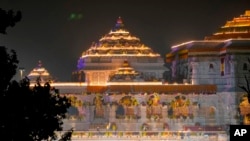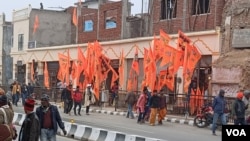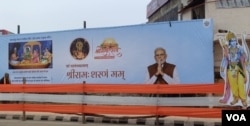A north Indian town is preparing for a mega event next week, as Prime Minister Narendra Modi will inaugurate a grand Hindu temple that symbolizes the country’s surging Hindu cultural nationalism, a movement also known as Hindutva.
The inauguration of the grand temple in Ayodhya, India is set for Monday, January 22. The temple is dedicated to the Hindu deity Lord Ram and stands on the site of a demolished 16th-century mosque. Some Hindu leaders have begun calling the town a "Hindu Vatican."
Many Hindus claim that Ram was born in Ayodhya, in the state of Uttar Pradesh — exactly at the site where the mosque stood and that Muslim invaders built it on the ruins of an ancient Ram temple.
In 1992, a right-wing Hindu mob razed the Babri Masjid mosque, triggering communal violence that killed about 2,000 people across the country.
After decades of legal fighting between Hindus and Muslims, India’s Supreme Court ruled in 2019 the site belonged to Hindus, marking a victory for the Hindu groups and Modi’s nationalist Bharatiya Janata Party (BJP).
When the temple made of 600,000 cubic feet of pink sandstone and white marble at a cost of $180 million is fully completed — reportedly by the end of next year — it will be the country’s largest Hindu temple.
The weeklong consecration of the Ram temple began Tuesday, marking the start of the ritual that will culminate with the inauguration of the temple by Modi on Monday, when the idol of Ram will be enthroned at its sanctum-sanctorum.
Ayodhya, known for centuries as a tranquil temple town, is gearing up to turn into a bustling hub for Hindu religious tourists.
The town has undergone a massive makeover with roads being widened, decorative arched gates being erected, and colored murals depicting incidents in Ram’s life being painted on walls. A new airport in Ayodhya became operational last month and the town’s railway station has been expanded.
The temple trust has invited more than 7,500 high-profile Hindu religious and political leaders, Bollywood stars, sports personalities, industrialists and others to the ceremony.
The ceremony will be livestreamed so Hindus across the country and abroad can watch it. Additionally, Indian embassies across the world and a sponsored screen at Times Square in New York will provide the live screening of the Ayodhya inauguration.
Schools in several Indian states have announced a holiday Monday. The federal government also declared a half-day at all its offices that day.
‘World’s holiest site for Hindus’
Rabindra Narain Singh, president of India’s largest Hindu organization, Vishva Hindu Parishad, said that with the establishment of the Ram temple, Ayodhya would be the holiest site for Hindus in the world.
"Ram’s birthplace will be developed for the Hindus the way the Vatican City and Mecca were done for Christians and Muslims," Singh said.
Modi said in a recent speech that the Ram Mandir in Ayodhya would mark the beginning of a cultural revival of India.
"The entire world is eagerly awaiting the historical moment about to take place in Ayodhya on January 22. We are truly lucky, to get a chance to witness a momentous event like this in our lifetime," Modi said.
Since Babri Masjid was demolished, over the past three decades the BJP made the building of the Ram Mandir the centerpiece of its election campaign promises. Modi is inaugurating the temple in Ayodhya ahead of the crucial general elections — to be held in April and May — with his party eyeing a record third consecutive term.
Inauguration part of a political strategy?
Opponents of Modi say the inauguration of the temple is part of a political strategy to stoke religious sentiments to garner more Hindu votes in the upcoming elections.
Saying that the inauguration of the incomplete temple ahead of the election was a political gimmick, many opposition leaders have turned down invitations to attend Monday’s event. The BJP has called the opposition leaders "anti-Hindu" for refusing to attend the inauguration ceremony.
Some top Hindu religious leaders have criticized Modi and his party for using the inauguration of Ram Mandir for "political gains."
Swami Nischalananda Saraswati, one of the four Shankaracharyas or heads of four top Hindu monasteries in the country, said the consecration of a temple is done by seers and saints.
"But in this case, the prime minister is doing the consecration ritual, going against the religious tradition. I will not attend the ceremony in Ayodhya," Saraswati said.
Social activist and Delhi University professor Apoorvanand, who uses one name, pointed out the federal and Uttar Pradesh state governments are participating in and patronizing the inauguration of the Ram Mandir.
"This is a clear violation of the secular principle of India which does not allow the state to merge itself with any religion or religious activity. The prime minister is acting as the chief host of the event. The governments are working in support of a religious program," Apoorvanand told VOA.
"It marks the end of the secular India, symbolically and substantively."
Muslims feel othered
Following the 2019 Supreme Court judgment, Muslims were allotted a piece of land 25 kilometers away, to build a mosque. Construction of that mosque has not begun yet.
"The UP [Uttar Pradesh] government is spending millions of rupees for the development of the Hindu religious places in Ayodhya. But it has not supported the construction of the mosque," Mohammad Azam Qadri, president of a Muslim organization in Ayodhya, told VOA.
"We are not even being allowed to renovate dozens of dilapidated mosques in Ayodhya. Many mosques, graveyards and other Muslim shrines in Ayodhya are being targeted by land-grabbers. The government is not paying heed to our appeals to help protect the Muslim religious properties … I am not sure if Muslims will be able to live in Ayodhya in the future."
Former chairman of the Delhi Minorities Commission, and Muslim community leader Zafar ul-Islam Khan said that despite being the head of a secular country, Modi laid the foundation of Ram Mandir in 2020 and now is going to inaugurate it.
"Hindu zealots now feel emboldened after they demolished Babri mosque and see the Ram Temple come up at its place. Now, they are going to lay claim to dozens of other historical mosques claiming that they were built at the site of demolished temples," Khan told VOA.
Courts are entertaining suits from Hindutva groups despite a 1991 law that guarantees the maintenance of the statuses of places of worship as they existed in August 1947, he said.














